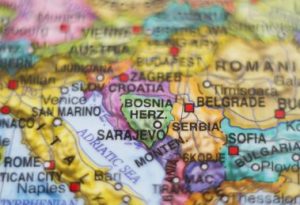
According to Serbian Economist, organized crime groups from the Western Balkans have ties in Venezuela and are involved in investigations related to cocaine smuggling, Radio Free Europe (RFE) reports.
According to RSE, networks from the Balkans are considered by international organizations, including Europol and Interpol, to be key players in the supply of cocaine from Latin America to Europe, with Venezuela seen as one of the links in this logistics chain.
Sasha Djordjevic, an expert at the Global Initiative against Transnational Organized Crime (GI-TOC), told RSE that Venezuela is important for cocaine flows as a “strategic outlet” to the Atlantic, although it is not the only and main point of support in the region for Balkan groups.
RSE notes that interest in Venezuela’s role in drug trafficking has intensified following the early January arrest of Venezuelan leader Nicolas Maduro, who has been charged in the US and pleaded not guilty in a New York court on January 5.
As one example, RSE cites the case of the detention of the Aressa off the coast of Aruba in February 2020, when, according to the publication, about five tons of cocaine were seized and 11 Montenegrin crew members were detained. In March 2021, an Aruban court sentenced them to prison terms ranging from nine to 15 years. In addition, according to RSE, Europol linked Serbian citizen Miroslav Starčević, who was detained in May 2023 along with other suspects, to this case, and the proceedings in Serbia are currently under judicial review, according to the publication.
RSE also notes that Europol reported no direct cooperation with Venezuela, so information about the possible involvement of Balkan groups is obtained indirectly – through the law enforcement agencies of the countries in the region, while the Interior Ministries of Serbia and Montenegro, according to RSE, did not respond to requests prior to the publication of the material.

Cryptocurrencies are increasingly becoming part of the global financial system, and countries in the Balkan region are demonstrating a variety of approaches to their regulation.
Serbia
Status: Officially recognized and regulated.
Legislation: Law on Digital Assets (2020).
Regulators: The National Bank of Serbia and the Securities Commission.
Taxes:
Capital gains tax: 15%.
Income tax: 15%.
Penalties: Up to 5 million dinars ($46,400) or 20% of annual income for operating without a license.
Croatia
Status: Not recognized as legal tender, but not prohibited.
Regulation: There is no special law, operations are regulated by general rules.
Taxes: Income from cryptocurrencies is subject to capital gains tax.
Albania
Status: Regulated by law (2020).
Regulators: Financial Supervision Authority and National Agency for Information Society.
Taxes:
Capital gains tax: 15%.
Corporate tax: 15%.
Sanctions: Administrative fines and restrictions on activities.
Status: There is no special legislation, operations with cryptocurrencies are not prohibited.
Warnings: The central bank notes the risks associated with cryptocurrencies.
Bosnia and Herzegovina
Status: Not legal tender, no exchange for official currency is possible.
Taxes: The tax on income from transactions is 10%.
Regulation: There is no legislation, but trading and buying cryptocurrencies is allowed.
Republika Srpska (part of Bosnia and Herzegovina)
Status: Cryptocurrencies are legalized (amendments to the law on the securities market, 2022).
Supervision: Securities Commission.
Taxes: Income tax is 10%.
North Macedonia
Status: Not recognized as legal tender.
Regulation: There is no regulation, cryptocurrency activities are not prohibited.
Kosovo
Status: Not recognized as legal tender, no special legislation.
Restrictions: A complete ban on mining has been introduced since 2022 due to the energy crisis.
Approaches to cryptocurrencies in the Balkans vary:
Serbia and Albania establish a clear legal framework, ensuring the legality of operations.
Montenegro and North Macedonia have no special regulation, but do not prohibit its use.
Kosovo restricts activities due to the energy crisis.
It is important for potential users and investors to study local laws and consult with experts to work safely and legally with cryptocurrencies in the region.
Source: https://t.me/relocationrs/434

Doing business in the Balkans is attractive to entrepreneurs due to the diversity of tax regimes, relatively low operating costs and growing economic opportunities. This report examines key indicators of doing business in eight countries in the region: North Macedonia, Bulgaria, Serbia, Croatia, Montenegro, Kosovo, Albania, Bosnia and Herzegovina.
1. ease of doing business (Doing Business 2020)
Countries are ranked from best to worst:
North Macedonia – 17th place (leader in the region)
Serbia – 44th place
Montenegro – 50th place
Croatia – 51st place
Kosovo – 57th place
Bulgaria – 61st place
Albania – 82nd place
Bosnia and Herzegovina – 90th place
Conclusion: North Macedonia offers the best business environment in the region, while Bosnia and Albania are at the bottom of the list and need to improve their business climate.
2. Tax burden
Countries are ranked by their corporate tax rate (from lowest to highest):
Montenegro: income tax – 9%, VAT – 21%, dividend tax – 9%.
Bulgaria: income tax – 10%, VAT – 20%, dividend tax – 5%
North Macedonia: income tax – 10%, VAT – 18%, dividend tax – 10%
Kosovo: income tax – 10%, VAT – 18%, dividend tax – 0%
Bosnia and Herzegovina: corporate income tax – 10%, VAT – 17%, dividend tax – 5%.
Croatia: corporate income tax – 10%-18%, VAT – 25%, dividend tax – 10%.
Serbia: income tax – 15%, VAT – 20%, dividend tax – 15%
Albania: income tax – 15%, VAT – 20%, dividend tax – 8%.
Conclusion: Montenegro has the lowest tax burden on profits (9%), and Kosovo has no tax on dividends.
3. Registration of a company
State fee: €50-€150
Notary services: €30-€200
Bank deposit: Not required
Conclusion: The process of company incorporation in the Balkans is relatively inexpensive and fast, with minimal bank deposit requirements.
4. Average salary (€ per month)
Countries are ranked in descending order of average salary:
Croatia: €1,150
Bulgaria: €830
Serbia: €770
Montenegro: €730
Bosnia and Herzegovina: € 650
North Macedonia: €640
Albania: €520
Kosovo: €450
Conclusion: The highest salaries are in Croatia (€1,150) and Bulgaria (€830). Kosovo and Albania have the lowest rates, which reduces staffing costs but can make it difficult to find qualified specialists.
5. Office rent (€/m²/month)
The countries are ranked in descending order of rental costs:
Serbia (Belgrade): €15-€25
Croatia (Zagreb): €14-€24
Bosnia and Herzegovina (Sarajevo): €12-€22
Albania (Tirana): €10-€20
North Macedonia (Skopje): €10-€20
Montenegro (Podgorica): €10-€18
Kosovo (Pristina): €8-€15
Conclusion: The most affordable office rents are in Kosovo, while the highest are in Serbia and Croatia.
6. Utilities (office 85 m², €/month)
Countries are ranked in descending order of utility costs:
Croatia: €160
Serbia: €150
Montenegro: €140
Bosnia and Herzegovina: €130
Bulgaria: €130
North Macedonia: €125
Albania: €120
Kosovo: €110
Conclusion: Kosovo remains the most affordable region in terms of utility costs, with Croatia leading the way in terms of the highest costs.
7. Internet and communication (€/month)
The countries are ranked in descending order of internet costs:
Croatia: €35
Serbia: €30
Albania: €25
Bulgaria: €25
Kosovo: €20
Conclusion: The cheapest internet is in Kosovo (€20) and Bulgaria (€25). In Croatia, the cost of the Internet is higher than the regional average.
Final analysis:
To minimize taxes: Montenegro, Bulgaria, Kosovo.
For developed infrastructure and highly qualified employees: Croatia, Serbia.
To start with minimal costs: Kosovo, Albania.
For stability and access to the EU: Croatia and Bulgaria.
The Balkan region offers a variety of business opportunities. The choice of country depends on the specific priorities of the company: whether it is the tax burden, the cost of labor, or operating costs.

The European Union has approved a humanitarian budget of EUR 1.4 billion, of which EUR 28 million will be allocated to finance projects to overcome the crisis caused by coronavirus (COVID-19) pandemic and climate change in Ukraine, the Western Balkans and the Caucasus. The relevant information was circulated by the European Commission in Brussels on Tuesday. “As global humanitarian needs worsen further due to the consequences of the coronavirus pandemic and the effects of climate change, the European Commission has adopted its initial annual humanitarian budget of EUR 1.4 billion for 2021. This represents an increase of more than 60% compared with the initial humanitarian budget of EUR 900 million adopted last year,” the commission said in a press release.
In addition, EUR 505 million will be allocated to Africa to support people affected by the long-term Lake Chad Basin crisis, impacting Nigeria, Niger, Cameroon, and Chad; those suffering from food and nutrition crisis, worsened by security incidents and community conflicts, in the Sahel (Burkina Faso, Mali, Mauritania, and Niger); and those displaced by armed conflicts in South Sudan, Central African Republic and Horn Of Africa (Somalia and Ethiopia).
Some EUR 385 million of EU humanitarian funding will be allocated to the needs in the Middle East and Turkey to help those affected by the Syria regional crisis, as well as the extremely severe situation in Yemen. Some EUR 180 million in humanitarian assistance will continue to help the most vulnerable populations in Asia and Latin America. In Latin America, this includes those affected by the crises in Venezuela and Colombia.
“The European Union will also continue to provide help in Asian countries such as Afghanistan, where the conflict has been qualified as one of the deadliest conflicts worldwide, and Bangladesh, which is currently hosting almost one million Rohingya refugees from Myanmar. The EU will also allocate EUR 28 million to fund projects addressing crises in Ukraine, Western Balkans and the Caucasus,” the commission said in the statement.
The rest of the funding, EUR 302 million, will be used for EU humanitarian air services and for unforeseen humanitarian crises or sudden peaks in existing crises.